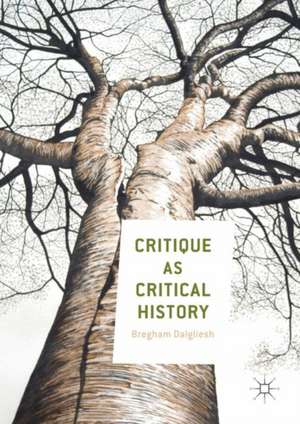Critique as Critical History
Autor Bregham Dalglieshen Limba Engleză Hardback – 7 sep 2017
| Toate formatele și edițiile | Preț | Express |
|---|---|---|
| Paperback (1) | 495.52 lei 38-44 zile | |
| Springer International Publishing – 11 aug 2018 | 495.52 lei 38-44 zile | |
| Hardback (1) | 585.73 lei 6-8 săpt. | |
| Springer International Publishing – 7 sep 2017 | 585.73 lei 6-8 săpt. |
Preț: 585.73 lei
Preț vechi: 689.09 lei
-15% Nou
Puncte Express: 879
Preț estimativ în valută:
112.10€ • 116.72$ • 94.74£
112.10€ • 116.72$ • 94.74£
Carte tipărită la comandă
Livrare economică 10-24 martie
Preluare comenzi: 021 569.72.76
Specificații
ISBN-13: 9783319610085
ISBN-10: 3319610082
Pagini: 231
Ilustrații: X, 252 p.
Dimensiuni: 148 x 210 mm
Greutate: 0.47 kg
Ediția:1st ed. 2017
Editura: Springer International Publishing
Colecția Palgrave Macmillan
Locul publicării:Cham, Switzerland
ISBN-10: 3319610082
Pagini: 231
Ilustrații: X, 252 p.
Dimensiuni: 148 x 210 mm
Greutate: 0.47 kg
Ediția:1st ed. 2017
Editura: Springer International Publishing
Colecția Palgrave Macmillan
Locul publicării:Cham, Switzerland
Cuprins
1. Introduction.- 2. Critique and the subject of knowledge.- 3. Critique and the subject of right.- 4. Archaeology and knowledge.- 5. Genealogy and power.- 6. Critical history and ethics.- 7. Critique as critical history.
Notă biografică
Bregham Dalgliesh is associate professor at the University of Tokyo, Japan. He previously taught in Canada, the U.K. and France, where he remains an associate researcher of LASCO (Laboratoire Sens et Compréhension du monde contemporain) at the Institut Mines-Télécom. He has published widely across disciplines, with the task of philosophical critique taken up through an engagement with the multifarious effects of technoscience on the human condition.
Textul de pe ultima copertă
This book presents the first sustained articulation of a Foucauldian œuvre. It situates Foucault’s critique within the tradition of Kant’s call for a philosophical archaeology of reason; in parallel, it demonstrates the priority in Foucault’s thought of Nietzsche over Heidegger and the framing of reason against an ontology of power. Bregham Dalgliesh hereby claims that at the heart of the Foucauldian œuvre is the philosophical method of critical history. Its task is to make the will to know that drives thought conscious of itself as a problem, especially the regimes of truth that define our governmentalities. By revealing the contingency of their constituent parts of knowledge, power and ethics, Dalgliesh demonstrates that critical history offers an alternative mode of critique to the hithertofore singular reading of the intellectual heritage of enlightenment, while it fosters an agonistic concept of freedom in respect of our putatively necessary limits.
Caracteristici
Articulates the idea of Foucauldian œuvre, or critical history Interprets how Foucault works both through and beyond Kant and Neitzsche Advocates an agnostic concept of freedom, or creative resistance, as the constitutive effect of power and knowledge Includes supplementary material: sn.pub/extras
